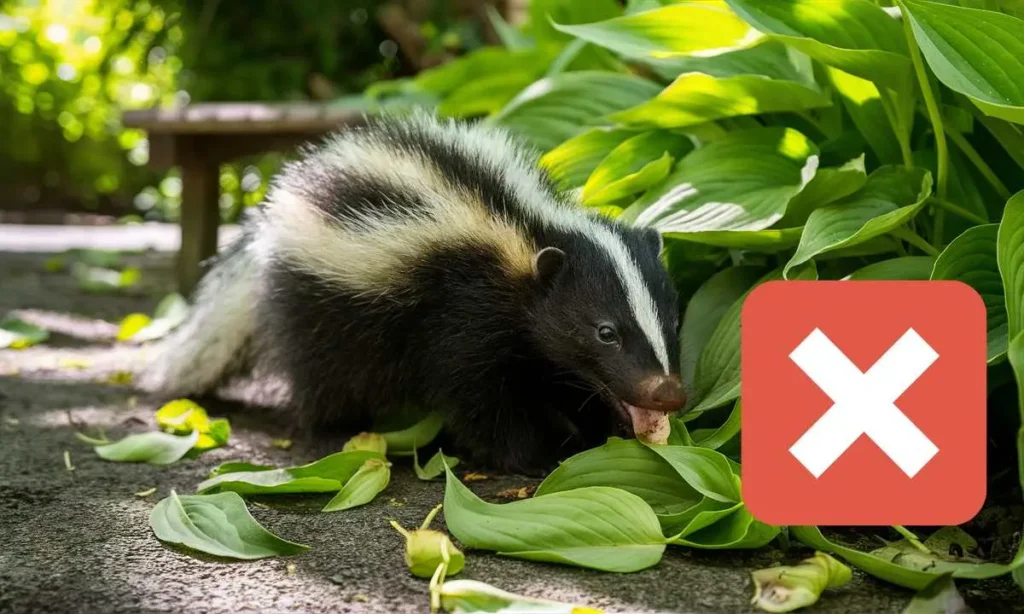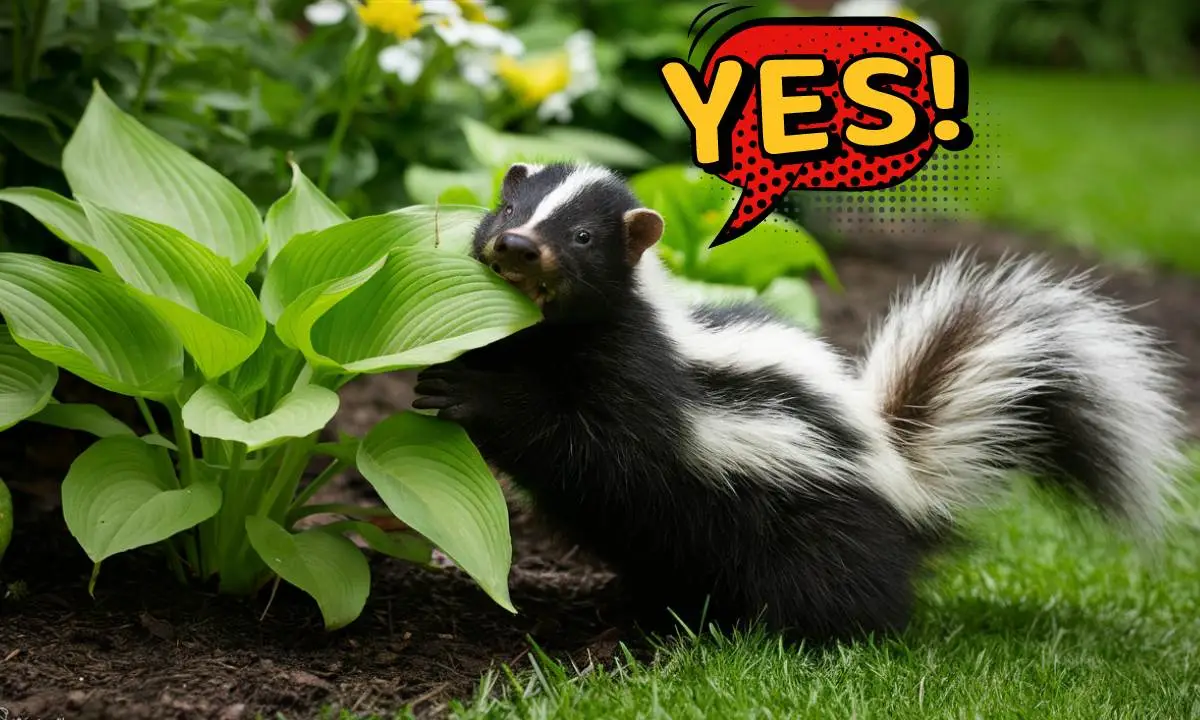Do Skunks Eat Hostas?
Last updated on August 11th, 2024 at 07:31 am
Yes, they might, especially when food is scarce. From my years of caring for skunks and studying wildlife, I’ve seen these animals turn to hostas for a meal. Skunks are mostly bug eaters, but they can dig up and eat hosta roots and leaves. Keep reading to find out how to safeguard your garden from these unexpected visitors.
Skunks And Hostas
Many garden enthusiasts adore hostas for their lush foliage and shade-loving nature. But, these plants can attract various animals, including skunks. Understanding the relationship between skunks and hostas is crucial for gardeners. The key lies in knowing what draws these creatures to hostas and how to spot the tell-tale signs of their presence.
Skunks And Their Attraction To Hostas
Gardeners often find themselves asking, “Do skunks eat hostas?” The answer isn’t straightforward. Skunks are omnivores, meaning their diet includes both plants and animals. While they may not specifically seek out hostas to eat, these plants can attract skunks for several reasons:
- Insects: Hostas are known to house various insects, a primary food source for skunks.
- Shelter: The broad leaves of hostas provide skunks with a cool, moist area to rest during hot days.
- Grubs: Hostas can be affected by grubs, which are beetle larvae that live in the soil. Skunks dig for these grubs and can inadvertently damage the plants.
When skunks roam in search of food, they may inadvertently trample or dig up hostas. The table below summarizes key attractions for skunks in a garden with hostas:
| Attraction | Description |
|---|---|
| Insects | Skunks eat the insects found on or around hostas. |
| Shelter | The plants provide a cool spot for skunks to hide. |
| Grubs | Skunks dig for grubs, disturbing the hostas’ root systems. |
Damage Caused By Skunks To Hostas
Skunks can cause significant damage to hostas in their quest for food and shelter. Their foraging habits lead them to dig up the soil, which can harm the plant’s root system. Here are the main types of damage gardeners might see:
- Uprooted Plants: Skunks might dig up hosta plants, exposing roots and harming their chances of survival.
- Torn Leaves: As skunks move through the garden, they can tear the leaves of hostas, damaging their appearance.
- Soil Disturbance: Their digging for insects and grubs can disrupt the soil around hostas, affecting their growth.
Recognizing skunk damage early is vital for taking action to protect hostas. Signs of skunk activity include holes in the soil, upturned plants, and torn leaves. Gardeners should look out for these issues to keep their hostas healthy and thriving. The list below highlights the common signs of damage caused by skunks:
| Indicates skunk-digging activity. | Root exposure can stress or kill hosts. |
|---|---|
| Holes in Soil | Root exposure can stress or kill hosts. |
| Uprooted Plants | Root exposure can stress or kill hostas. |
| Torn Leaves | Damages the aesthetics and health of the plant. |
Preventing Skunks From Eating Hostas

Do skunks eat hostas? Yes, they do. Skunks are omnivores, which means they eat both plants and animals. Your beautiful hostas can become a snack for them. Preventing skunks from eating hostas is crucial to keep your garden safe. Let’s explore some effective ways to protect your hostas from skunks.
Natural Deterrents
Using natural deterrents is a safe and eco-friendly way to keep skunks away from your hostas. Here are some effective natural deterrents:
- Ammonia-soaked rags: Skunks dislike the strong smell of ammonia. Place these rags near hostas to repel skunks.
- Citrus peels: The scent of citrus is another skunk repellent. Scatter lemon or orange peels around your garden.
- Pepper sprays: Make a pepper spray by mixing water with hot pepper. Spray it around the hostas. It irritates skunks’ noses.
Here’s a table summarizing the natural deterrents:
| Deterrent | Description |
|---|---|
| Ammonia-soaked rags | Place near hostas to repel skunks with the smell of ammonia. |
| Citrus peels | Scatter around the garden to use the citrus scent as a repellent. |
| Pepper sprays | Spray around hostas to irritate skunks’ noses. |
These natural methods can help keep skunks at bay, protecting your hostas.
Physical Barriers
Creating physical barriers can effectively prevent skunks from reaching your hostas. Here are some options:
- Fencing: Install a fence around your garden. Make sure it’s dug at least 1 foot underground to prevent skunks from digging under.
- Mesh covers: Cover your hostas with mesh covers at night. This prevents skunks from accessing the plants.
- Motion-activated sprinklers: These sprinklers turn on when they detect motion, scaring skunks away.
Below is a table showing the effectiveness of physical barriers:
| Barrier | Effectiveness |
|---|---|
| Fencing | Highly effective if installed properly. |
| Mesh covers | Effective at night when skunks are most active. |
| Motion-activated sprinklers | Scare skunks away with sudden water spray. |
Implementing these physical barriers can provide long-term protection for your hostas against skunks.
Frequently Asked Questions
Deer and slugs are common predators of hostas. Rabbits, voles, and snails also enjoy eating these leafy plants.
Slugs and snails are the most common pests eating hosta leaves. Deer and rabbits can also munch on the foliage. Use slug bait or natural repellents to protect your hostas.
To protect hostas from animals, sprinkle crushed eggshells or use a natural repellent spray containing capsaicin. Surround plants with a physical barrier like chicken wire for added defense.
Conclusion
Wrapping up, skunks may not be the first garden pest you think of, but they do snack on hostas. It’s crucial to implement preventive measures to protect your plants. By understanding their habits, you can keep your garden thriving. Remember, a little effort goes a long way in safeguarding your hostas from these nocturnal visitors.

